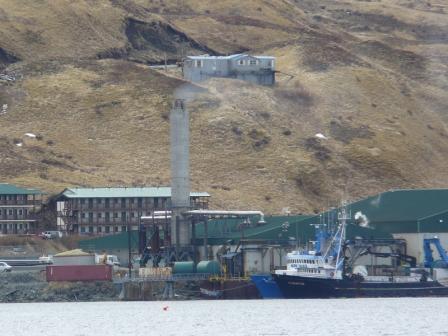News Releases from Region 10
EPA Settles with Westward Seafoods for Violating Federal Clean Air Rules in Dutch Harbor, Alaska
Seattle — The U.S. Environmental Protection Agency and Department of Justice today announced a settlement with Westward Seafoods to resolve alleged Clean Air Act violations at its Captain’s Bay seafood processing plant in Dutch Harbor, Alaska. As part of the settlement, Westward is required to use new electronic systems for monitoring, recordkeeping and reporting, to properly train personnel for compliance, and to implement a more robust preventative maintenance and operations plan.
Westward Seafoods came forward to EPA and to the state of Alaska with information about the company’s air permit violations after the company discovered that three employees had turned off air pollution controls from 2009 to 2011 and falsified records to hide their actions. Prior to this discovery, the company had submitted the falsified records to EPA and the state of Alaska, which resulted in criminal prosecutions against the three individuals in federal court in 2014. Today’s settlement resolves the company’s civil liability for all of the Clean Air Act violations.
“We rely on permitted facilities to self-monitor and report on their compliance with Clean Air Act requirements, so the submission of falsified records undermines our ability to protect public health and the environment,” said Edward Kowalski, Director of the Office of Compliance and Enforcement in EPA’s Seattle office. “This settlement requires significant third party independent oversight of Westward Seafoods’ operations to monitor and verify the use of required pollution controls.”
“Air permits are put into place to protect air quality and public health. Turning off pollution controls and falsifying records are serious violations,” said Denise Koch, Director of the Alaska Department of Environmental Conservation Division of Air Quality. “We’re satisfied that this agreement’s mitigation projects and enhanced system to verify compliance will reduce air pollution on Unalaska Island.”
Due to Westward Seafoods’ failure to use required air pollution controls and failure to accurately report its air emissions, the settlement requires an independent third party auditor to conduct an annual inspection of the facility and review its records twice a year to monitor and verify compliance with the consent decree and its Clean Air Act permits. Westward will also spend $1.1 million on air pollution reduction projects, more than $800,000 on other injunctive relief, and pay a $1.3 million civil penalty. The state of Alaska, a co-plaintiff in the case, will receive $228,000 of the civil penalty.
Westward Seafoods will conduct two mitigation projects to offset its excess emissions of nitrogen oxides or NOX pollution. EPA estimates that the company’s failure to operate pollution controls for two years resulted in nearly 105 excess tons of harmful NOX emissions. NOX is composed of highly reactive gasses which form quickly from fuel burning emissions from cars, trucks and buses, and power plants. Breathing air with high levels of NOX can cause or aggravate respiratory diseases, particularly asthma.
Westward’s sister company, Alyeska Seafoods, operates a seafood processing facility two miles from Westward’s Captain’s Bay facility. Westward will replace existing lighting at both facilities with energy efficient lighting to reduce the need for generated electricity and reduce NOx emissions. The Alyeska facility will also install a five megawatt transformer and make other associated changes to provide an electrical connection to the city of Unalaska’s power plant, which generates lower NOX emissions than the Alyeska facility’s generators. Once these changes are made, the settlement prohibits the use of the two largest and higher polluting generators at the Alyeska facility except when city power is unavailable or during other emergencies.
Westward and Alyeska are required to operate the pollution mitigation projects for three years, which is expected to result in 140 tons of fewer NOX emissions. The projects will also reduce emissions of sulfur dioxide and particulate matter. The mitigation is likely to continue in use beyond three years, resulting in almost 48 tons per year of additional NOX reductions into the future. The reduced emissions will help protect the air quality in the communities surrounding the facilities, including the Qawalangin Tribe of Unalaska, an Alaska Native Village.
In 2010, Westward Seafoods agreed to a consent decree with EPA and the Justice Department, and paid a $570,000 penalty, to resolve previous violations of the Clean Air Act and the Emergency Planning and Community Right-to-Know Act at the Captain’s Bay Facility. Westward’s recent violations also violated the 2010 consent decree. Today’s settlement resolves all claims for civil penalties and injunctive relief under Westward’s Clean Air Act permits and for stipulated penalties under the 2010 consent decree.
Today’s consent decree, lodged in the U.S. District Court for the District of Alaska today, is subject to a 30-day public comment period and approval by the federal court. A copy of the consent decree is available at: http://www.justice.gov/enrd/Consent_Decrees.html.
Photo below: Westward Seafoods Captain’s Bay Facility in Dutch Harbor, Alaska. The seafood processing plant is powered by three diesel-fueled electric generators and produces steam for fish production with two diesel-fired boilers, all operated under Clean Air Act permits issued by the Alaska Department of Environmental Conservation. (U.S. EPA, 2011)
 Westward Seafoods Captain’s Bay Facility in Dutch Harbor, Alaska. The seafood processing plant is powered by three diesel-fueled electric generators and produces steam for fish production with two diesel-fired boilers, all operated under Clean Air Act permits issued by the Alaska Department of Environmental Conservation. (EPA, 2011)
Westward Seafoods Captain’s Bay Facility in Dutch Harbor, Alaska. The seafood processing plant is powered by three diesel-fueled electric generators and produces steam for fish production with two diesel-fired boilers, all operated under Clean Air Act permits issued by the Alaska Department of Environmental Conservation. (EPA, 2011)
